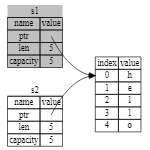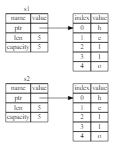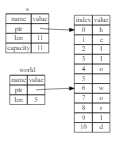第四章 Ownership 类属
Ownership is Rust’s most unique feature, and it enables Rust to make memory safety guarantees without needing a garbage collector.
stack: last in, first out
push onto; pop off
All data stored on the stack must have a known, fixed size.
heap:
Data with an unknown size at compile time or a size that might change must be stored on the heap instead.
allocating
- Each value in Rust has a variable that’s called its owner.
- There can only be one owner at a time.
- When the owner goes out of scope, the value will be dropped.
Example:
fn main() {
let mut s = String::from("hello");
s.push_str(", world!"); // push_str() appends a literal to a String
println!("{}", s); // This will print `hello, world!`
}
When a variable goes out of scope, Rust calls a special function for us. This function is called drop, and it’s where the author of String can put the code to return the memory. Rust calls drop automatically at the closing curly bracket.
Note: In C++, this pattern of deallocating resources at the end of an item’s lifetime is sometimes called Resource Acquisition Is Initialization (RAII). The drop function in Rust will be familiar to you if you’ve used RAII patterns.
-
move
If you’ve heard the terms shallow copy and deep copy while working with other languages, the concept of copying the pointer, length, and capacity without copying the data probably sounds like making a shallow copy. But because Rust also invalidates the first variable, instead of being called a shallow copy, it’s known as a move. In this example, we would say thats1was moved intos2.
Rust will never automatically create “deep” copies of your data. Therefore, any automatic copying can be assumed to be inexpensive in terms of runtime performance. -
clonefn main() { let s1 = String::from("hello"); let s2 = s1.clone(); println!("s1 = {}, s2 = {}", s1, s2); }When you see a call to
clone, you know that some arbitrary code is being executed and that code may be expensive. It’s a visual indicator that something different is going on.
If a type has theCopytrait, an older variable is still usable after assignment. Rust won’t let us annotate a type with theCopytrait if the type, or any of its parts, has implemented theDroptrait. If the type needs something special to happen when the value goes out of scope and we add theCopyannotation to that type, we’ll get a compile-time error.
Here are some of the types that are Copy:
All the integer types, such as u32.
The Boolean type, bool, with values true and false.
All the floating point types, such as f64.
The character type, char.
Tuples, if they only contain types that are also Copy. For example, (i32, i32) is Copy, but (i32, String) is not.
The semantics for passing a value to a function are similar to those for assigning a value to a variable. Passing a variable to a function will move or copy, just as assignment does.
The ownership of a variable follows the same pattern every time: assigning a value to another variable moves it. When a variable that includes data on the heap goes out of scope, the value will be cleaned up by drop unless the data has been moved to be owned by another variable.
It’s possible to return multiple values using a tuple, but this is too much ceremony and a lot of work for a concept that should be common. Luckily for us, Rust has a feature for this concept, called references.
References
Borrowing
We call having references as function parameters borrowing.
We’re not allowed to modify something we have a reference to.
Mutable References
fn main() {
let mut s = String::from("hello");
change(&mut s);
}
fn change(some_string: &mut String) {
some_string.push_str(", world");
}
But mutable references have one big restriction: you can have only one mutable reference to a particular piece of data in a particular scope. The benefit of having this restriction is that Rust can prevent data races at compile time. As always, we can use curly brackets to create a new scope, allowing for multiple mutable references, just not simultaneous ones:
fn main() {
let mut s = String::from("hello");
{
let r1 = &mut s;
} // r1 goes out of scope here, so we can make a new reference with no problems.
let r2 = &mut s;
}
Dangling References
fn dangle() -> &String { // dangle returns a reference to a String
let s = String::from("hello"); // s is a new String
&s // we return a reference to the String, s
} // Here, s goes out of scope, and is dropped. Its memory goes away.
// Danger!
fn main() {
let string = no_dangle();
}
fn no_dangle() -> String {
let s = String::from("hello");
s
}
- At any given time, you can have either one mutable reference or any number of immutable references.
- References must always be valid.
Slice
A string slice is a reference to part of a String.
We can create slices using a range within brackets by specifying [starting_index..ending_index], where starting_index is the first position in the slice and ending_index is one more than the last position in the slice. Internally, the slice data structure stores the starting position and the length of the slice, which corresponds to ending_index minus starting_index.
fn first_word(s: &String) -> &str {
let bytes = s.as_bytes();
for (i, &item) in bytes.iter().enumerate() {
if item == b' ' {
return &s[0..i];
}
}
&s[..]
}
fn main() {
let my_string = String::from("hello world");
// first_word works on slices of `String`s
let word = first_word(&my_string[..]);
let my_string_literal = "hello world";
// first_word works on slices of string literals
let word = first_word(&my_string_literal[..]);
// Because string literals *are* string slices already,
// this works too, without the slice syntax!
let word = first_word(my_string_literal);
}
The concepts of ownership, borrowing, and slices ensure memory safety in Rust programs at compile time. The Rust language gives you control over your memory usage in the same way as other systems programming languages, but having the owner of data automatically clean up that data when the owner goes out of scope means you don’t have to write and debug extra code to get this control.


